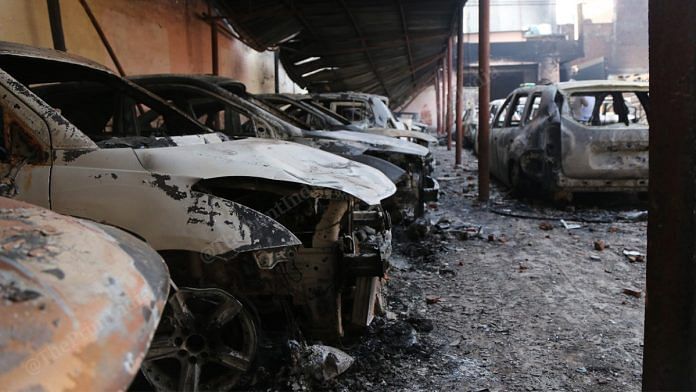As Delhi burned, institutions looked away
Harsh Mander | Human rights activist and writer
The Hindu
Mander argues that the violence in Northeast Delhi “signals the disgraceful and comprehensive collapse of every institution of the Indian state without any exception”. He says not only did the police and judiciary fail but the “National Human Rights Commission, the National Commission for Minorities, and the National Commission for Protection of Child Rights” were also missing in action as Delhi burned.
Katju argues that India’s approach in foreign policy in Modi’s first term “showed a more confident and outwardly focused India” while in his second term it has changed to defensive. He cites various criticisms that India faced in trade policy and domestic policy such as the revocation of Article 370 last year and the contentious Citizenship Amendment Act, and argues that India should implement policy in ways that will “not raise such doubts”.
Yes Bank rescue: India’s TARP moment?
Tamal Bandyopadhyay | Senior adviser to Jana Small Finance Bank Ltd.
Business Standard
In light of the Yes Bank moratorium, Bandyopadhyay elaborates on the need to place the bank under moratorium and capping withdrawal deposits. He explains that flight of deposits was one of the major issues with Yes Bank and while investors “were willing to take a bet” on the bank, regulator SEBI’s takeover norm and price formula came in the way. The only way these norms could be waived was through the moratorium route, notes Bandyopadhyay.
 It’s the incentives, stupid
It’s the incentives, stupid
Ajay Shah | Professor, National Institute of Public Finance and Policy
Business Standard
Shah also comments on the difficulties faced by Yes Bank and finds that it is a reflection of the “difficulties in the policy apparatus” and “impersonal working of incentives and information”. He concludes that the “solutions lie in institutional reform” and the next 25 years should involve a small banking system and improving “low state capacity in regulation”.
No green shoots of a revival in sight as yet
R. Nagaraj | Indira Gandhi Institute of Development Research, Mumbai
The Hindu
Nagaraj notes that according to NSO estimates, India’s GDP growth rate in the third quarter of the current fiscal, that is October-December 2019, was 4.7 per cent. This was an improvement from the previous quarter estimate of 4.5 per cent. He argues the quarterly growth figures are “largely extrapolations and projections of the annual figures” and “one should be cautious in reading too much into the specific numbers”. He says one should focus on annual GDP growth rate instead as “it probably suggests more pain ahead, as the green shoots of economic revival seem nowhere in sight”.
Don’t blame it on NSO
Pulak Ghosh | Professor IIM Bangalore
Soumya Kanti Ghosh | Group chief economic advisor, State Bank of India
Sumit Agarwal | Professor, National University of Singapore
The Indian Express
The writers argue that “the volatility of oil prices and structural changes in the economy make the forecasting of inflation and GDP a difficult job” and we should not put all the blame on RBI and NSO. They suggest supplementing “our existing measurement practices with ‘big data’ to make our statistical system more comprehensive and robust”.

The battle may have been lost at MCG but the war has been won: Women’s cricket is now a mass commercial spectacle
Boria Majumdar | Leading sport scholar and television commentator. Author of a number of bestselling books on Indian sports
The Times of India
Boria argues that even though the Indian women’s cricket team lost the T20 Worl Cup final to Australia, the game has won a larger battle. He argues that the “game now has respectability and economic viability and it can only get better from here on”. He states, “MCG has changed the women’s game forever” and “it has also changed our mindset in India to a degree”
 It makes no sense for us to panic over the coronavirus
It makes no sense for us to panic over the coronavirus
Sandipan Deb | Former editor of ‘Financial Express’, and founder-editor of ‘Open’ and ‘Swarajya’ magazines
Mint
Deb explains that COVID-19 “is just a new strain of a well-known bug” and criticises the panic around the epidemic. Given that people these days are “addicted to forwarding messages to gain cheap popularity, and too lazy to check if what we’re sharing is true”, it would seem the deadliest virus is fear, argues Deb.
An economic warning
N. Venkatram | CEO, Deloitte India
The Economic Times
Venkatram explains the merits of a caring economy — “A tech-enabled system to deliver citizen experience carries significant user advantages and a critical outcome”. He points out three facets of this system based on “signposts in the Economic Surveys”, which include an economy that is “designed around distinctive communities”, using technology for “efficient governance and taxpayer experience” and having taxation “viewed as a behavioural science with taxpayers as customers”.
Today’s Editorials
Hindustan Times: The Yes Bank crisis is far from over, writes HT, and notes that the bank needs to recapitalised. The bank extended loans to companies with questionable abilities to repay them and has approximately Rs 30,000 crore in junk-rated debt. The daily asks whether this was a result of poor risk assessment practices, herd mentality or plain old-fashioned kickbacks. RBI’s treatment of Yes bank co-founder Rana Kapoor, financial transactions involving his family and the promoters’ promptness in selling their stake in the bank needs to be investigated, it writes.
The Times of India: The daily writes that even though Team India lost the Women’s T20 World Cup, their performance in the tournament will inspire generations of young women. TOI also appreciates teenager player Shafali Verma, for her remarkable batting in the tournament.
The Indian Express: Iran’s Supreme Leader Ayatollah Ali Khamenei’s criticism of the Modi government over the Delhi riots could mark an important turning point in the continuing backlash from the Islamic countries, writes Express. The Modi government’s continuing reluctance to acknowledge the problem will pose challenges for India with respect to its relationship with Muslim countries, it notes.
(With inputs from Unnati Sharma)







